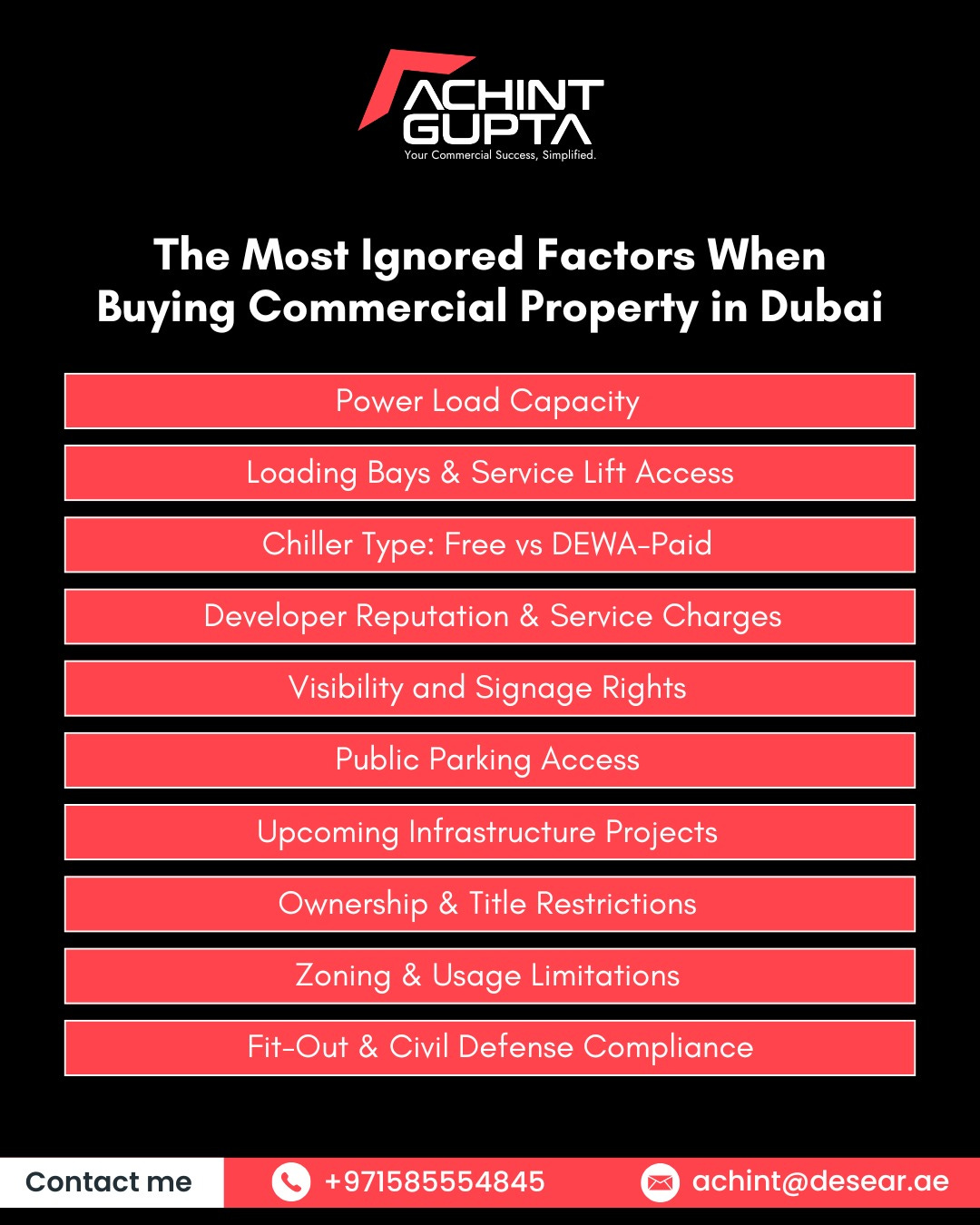The Most Ignored Factors When Buying Commercial Property in Dubai
Beyond ROI: The Hidden Factors That Make or Break Commercial Deals
As a commercial real estate consultant in Dubai, I often meet investors who evaluate properties solely on three things: location, price, and rental yield. While those are important, they're just the tip of the iceberg. What really separates a smart investment from a painful regret lies in the lesser-known, often-overlooked details.
If you're considering buying a commercial property in Dubai, here are the most ignored but critically important factors to look out for:
1. Power Load Capacity
Not all buildings are created equal when it comes to electrical infrastructure. A unit may look like a great deal, but if it only supports a low kW power load, forget about leasing it to a salon, restaurant, cloud kitchen, or tech firm. Upgrading power is complex, expensive, and in some buildings, downright impossible. Always ask for the current sanctioned load and whether it can be upgraded.
2. Loading Bays & Service Lift Access
This is especially relevant for retail, F&B, or logistics-heavy businesses. A lack of easy service access means delivery delays, tenant complaints, and potential lease failures. Many investors only see the storefront and ignore the operational backend — a costly mistake.
3. Chiller Type: Free vs DEWA-Paid
Cooling costs can significantly affect a tenant's monthly overhead. In Dubai, buildings either have free chiller (covered in service charges) or DEWA-metered chiller. The difference in operating cost could be several thousand dirhams a month. Tenants care about this — and so should you.
4. Developer Reputation & Service Charges
Some developers lure buyers with fancy brochures but maintain the building poorly while charging hefty service fees. High service charges reduce your net ROI and make your unit less attractive to cost-conscious tenants. Always check the annual service charge per sq.ft. and how it compares to market averages.
5. Visibility and Signage Rights
Just because a shop is on the ground floor doesn't mean you can install prominent signage. Signboard rights are regulated by the developer and Dubai Municipality. A retail space with no signage option is nearly invisible to walk-ins. Always confirm signboard placement permissions in writing.
6. Public Parking Access
If there’s no RTA or public parking nearby, tenants and customers will constantly complain. In high-density areas like Business Bay or Al Barsha, a lack of parking can be a dealbreaker. This directly affects your tenant's ability to retain clients.
7. Upcoming Infrastructure Projects
Future developments like metro line extensions or road widening can either boost your property's value or make access more difficult. Check the latest RTA and Dubai Municipality plans before you buy.
8. Ownership & Title Restrictions
Some commercial properties are part of hotel or managed buildings where lease terms are restricted by the master developer. You may not be allowed to lease freely or make changes to the layout. Always review the title deed and ownership rules.
9. Zoning & Usage Limitations
A stunning retail space doesn’t help if you can’t lease it to your target tenant. Dubai zoning laws dictate what kind of businesses can operate in which areas. Check the land use classification from the Dubai Land Department before you sign.
10. Fit-Out & Civil Defense Compliance
An expensive interior doesn’t guarantee legality. Tenants may need Dubai Civil Defense, DED, and DM approvals to operate. If the unit isn’t compliant, expect delays, penalties, and tenant frustration. Ask for copies of approved fit-out drawings and NOCs.
Final Thoughts
In Dubai’s competitive commercial real estate market, the best deals are made by those who do deeper due diligence. Don’t get blinded by ROI percentages alone — look beyond the obvious. The property’s technicals, compliance history, and operational usability often decide whether you'll enjoy passive income or endless headaches.
If you're considering a commercial property investment in Dubai and want to go beyond the brochure — let's talk. I’d be happy to walk you through the fine print before you sign on the dotted line.


